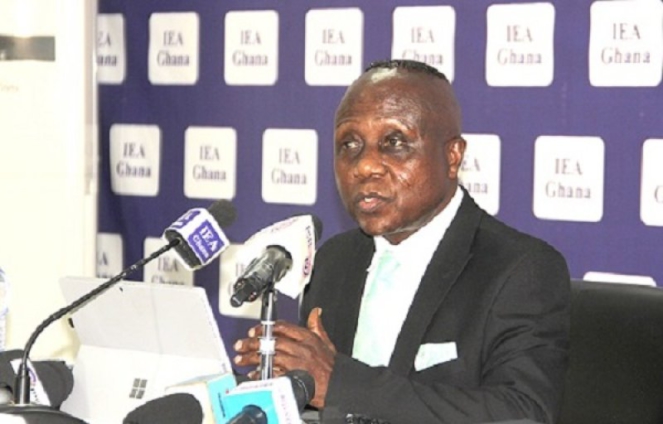The Institute of Economic Affairs (IEA) is warning against any increase in the Policy Rate (PR), saying, it will be disastrous for the economy.
It is however projecting an unchanged policy rate of 22% as the Monetary Policy Committee (MPC) of the Bank of Ghana meets today to review developments in the economy.
In a statement, the IEA said it expects the Bank of Ghana to work closely with the government to adopt additional targeted measures to fight the inflation crisis.
“As we have argued constantly, it is also clear that the PR alone cannot be relied on to address the current inflation crisis, especially in view of the peculiarity of the causes. If we push the PR to the limit, the consequences on the real economy could be disastrous”.
“Indeed, many countries around the globe have come to this realisation, and are taking unprecedented measures, beyond their orthodox inflation-management frameworks, to deal with what is, obviously, an unprecedented inflation crisis. In view of this, our expectation is that the MPC will keep the PR on hold at 22%. We expect the Bank of Ghana, however, to work with Government to adopt additional targeted measures to fight the inflation crisis”, it explained.
In the current era where the exchange rate has been under so much pressure, the IEA added it behooves the MPC to keep its policy tight so as to counter potential risk of capital outflows that has been heightened by the domestic economic difficulties and monetary policy tightening in the US, UK and Europe.
The MPC decision, it said must therefore recognise the projected outlook for the exchange rate based on information available to the committee.
In terms of the inflation outlook, it said the risks, on balance, seem to be tilted towards the upside. “The upside-risk factors include recent increases in fuel price and utility tariffs as well as anticipated hike in transport fares. On the other hand, anticipated seasonal increase in food supply and expected stability in the exchange rate due to anticipated inflows, which may, however, only be transient, represent partly-offsetting downside risks”.
Fighting inflation requires both fiscal and monetary actions
Inflation hit 33.9% in August, a rate it said was driven by supply and cost factors, particularly food, fuel and the exchange rate.
This it pointed out the inadequacy of the Inflation Targeting framework in dealing with these supply and cost drivers of inflation, especially at the primary level.
“As we have argued above, the current inflation crisis is largely driven by supply and cost factors, particularly food, fuel, transport, and the exchange rate. The effects of these factors can be illustrated by breaking down the August headline inflation of 33.9%: diesel inflation was 116.9%; petrol inflation, 80.5%; transport inflation (embedding fuel costs), 45.7%; imported inflation (reflecting the effect of the exchange rate), 35.2%; and food inflation, 34.4%. Meanwhile, in terms of relative contributions to the August inflation, food contributed the most (45.4%), followed by transport (14.3%). These factors have consistently dominated inflation over more than a year”.
“We have repeatedly pointed out the inadequacy of the IT framework in dealing with these supply and cost drivers of inflation, especially at the primary level, although, we acknowledge its potential role in stemming second-round effects of these factors. The supply and cost factors should be directly targeted with appropriate policy interventions”, it mentioned
To this end, it called for collaboration between the Bank of Ghana and the government to target directly the underlying causes of the nation’s inflation.
It therefore recommended interventions aimed to boost supply and or introduce subsidies as relevant.
"Countries around the world, including major economies, where inflation tends to be mostly demand-driven, and where demand-management approaches, such as IT, may be more appropriate tools, have resorted to interventions directed to the supply factors attendant to Covid-19 and the Russia-Ukraine war. The US has passed the Inflation Reduction Act. The new UK Prime Minister has imposed caps on energy prices for two years. France has capped fuel prices and limited electricity tariff increases to 4%. If these countries are taking these unorthodox and innovative measures to cushion their citizens, who are far richer than us, why can’t our policymakers be equally proactive?"
Latest Stories
-
EPA says lead-based paints are dangerous to health, calls for safer alternatives
25 minutes -
Queenmother calls on President-elect Mahama to appoint more women in his government
2 hours -
Atletico Madrid beat Barcelona to go top of La Liga
3 hours -
Usyk breaks Fury’s heart with points win in rematch
3 hours -
Ghana-Russia Centre to run Russian language courses in Ghana
8 hours -
The Hidden Costs of Hunger: How food insecurity undermines mental and physical health in the U.S.
9 hours -
18plus4NDC marks 3rd anniversary with victory celebration in Accra
11 hours -
CREMA workshop highlights collaborative efforts to sustain Akata Lagoon
12 hours -
2024/25 Ghana League: Heart of Lions remain top with win over Basake Holy Stars
13 hours -
Black Queens: Nora Hauptle shares cryptic WAFCON preparation message amid future uncertainty
13 hours -
Re-declaration of parliamentary results affront to our democracy – Joyce Bawah
13 hours -
GPL 2024/25: Vision FC score late to deny Young Apostles third home win
13 hours -
Enhancing community initiatives for coastal resilience: Insights from Keta Lagoon Complex Ramsar Site Workshop
13 hours -
Family Health University College earns a Presidential Charter
14 hours -
GPL 2024/25: Bibiani GoldStars beat Nsoatreman to keep title race alive
14 hours

